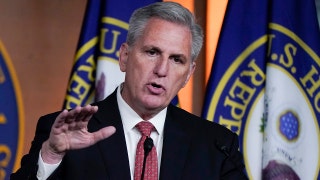Media top headlines August 12
In media news today, female viewers turn off 'Cuomo Prime Time' in droves, MSNBC's Joy Reid says DeSantis and Republicans are 'killing children' with COVID polices, and Brian Stelter gets roasted by critics after his interview with Stephen Colbert
A University of California-Berkeley dean and professor claimed Wednesday that the upcoming California recall election was "unconstitutional" because current Democratic Gov. Gavin Newsom could potentially lose with a larger plurality of votes than the winning candidate.
In a guest essay for the New York Times, dean Erwin Chemerinsky and professor Aaron S. Edlin argued that California's system for holding a recall election was "nonsensical and undemocratic," and should be declared unconstitutional because it "violates" the principle of one-person, one-vote, potentially denying Newsom supporters "equal protection."
"The most basic principles of democracy are that the candidate who gets the most votes is elected and that every voter gets an equal say in an election’s outcome," they wrote. "The California system for voting in a recall election violates these principles and should be declared unconstitutional."
The two described how the recall election would be split into two questions, the first being whether or not Newsom should remain governor, and the second being who should replace him if not. They noted that the first question would be decided by a majority vote, while the second would be decided by a plurality: the person with the most votes wins.
"By conducting the recall election in this way, Mr. Newsom can receive far more votes than any other candidate but still be removed from office," they wrote. "Many focus on how unfair this structure is to the governor, but consider instead how unfair it is to the voters who support him."
They described a scenario in which a candidate winning the plurality of votes on the second question, considering Newsom was recalled, received fewer votes than a minority of people voting not to support the recall in the first question.
PELOSI SAYS NEWSOM RECALL IS ‘NOT GOOD FOR CHILDREN AND OTHER LIVING THINGS’
"That scenario is not a wild hypothetical. Based on virtually every opinion poll, Mr. Newsom seems likely to have more votes to keep him in office than any other candidate will receive to replace him. But he may well lose the first question on the recall, effectively disenfranchising his supporters on the second question," they wrote.
"This is not just nonsensical and undemocratic. It is unconstitutional. It violates a core constitutional principle that has been followed for over 60 years: Every voter should have an equal ability to influence the outcome of the election," they added.
The two cited Supreme Court cases in which the disparity of sizes in electoral districts across the country, with the exception of the states when it comes to electing U.S. senators, were found to be unconstitutional.
CLICK HERE TO GET THE FOX NEWS APP
They claimed that, based off those cases, the California recall election violated the one-person one-vote principle.
"The California recall election, as structured, violates that fundamental principle. If Mr. Newsom is favored by a plurality of the voters, but someone else is elected, then his voters are denied equal protection. Their votes have less influence in determining the outcome of the election," they wrote.
"The stakes for California are enormous, not only for who guides us through our current crises — from the pandemic to drought, wildfires and homelessness — but also for how we choose future governors. The Constitution simply does not permit replacing a governor with a less popular candidate," they added.











































